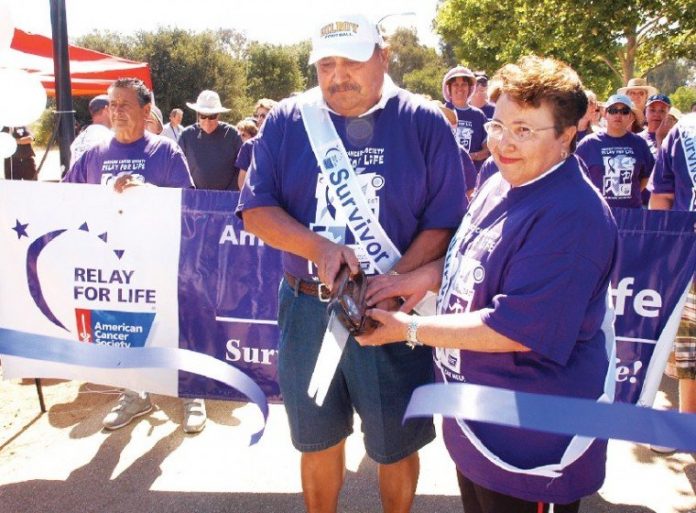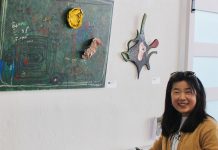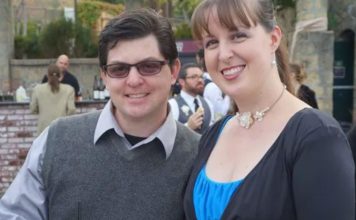Teams of several hundred cancer survivors, supporters and
friends walked laps around Christmas Hill Park Saturday and through
the night Sunday, raising more than $30,000 for the American Cancer
Society.
BY Perry Shirley Staff Writer
Gilroy – Teams of several hundred cancer survivors, supporters and friends walked laps around Christmas Hill Park Saturday and through the night Sunday, raising more than $30,000 for the American Cancer Society.
The money from the annual Relay For Life, which rolls through U.S. towns throughout the summer, will go to help fund ACS’ search for cures and improved treatments, but also advocacy, education and awareness programs and support services for cancer patients.
The real payoff, though, may come from the chance to celebrate survivors and those who take care of them, to leave behind gloomy memories, to play games and laugh, to share stories about loved ones fighting or loved ones who have lost the fight.
“The relay is just about a community coming together and supporting people who are in need,” said Debbi Sanchez, one of the event’s main organizers and a breast cancer survivor. “If I can help in some way to find a cure so people don’t have to go through what I did I’ll do what it takes.”
The estimated 80 cancer patients, whether still fighting the disease or having beaten it, walked the first lap alone. Because cancer isn’t a terribly selective disease, those who walked came from all age groups and ethnicities. Caretakers – whether it’s friends, close family members or licensed nurses – joined the survivors for the second lap in an acknowledgment of the burden placed on them.
“When I had cancer, I could make decisions about my body (but as a caretaker), you’re more powerless,” said Paula Ramos, a psychologist who runs the bi-weekly ACS South County Cancer Support Group. “It can be even more stressful to be a caretaker. You have to be able to take care of yourself as well and manage your own stress.”
The relay is about togetherness, many participants said. Judy Ornelas died from non-Hodgkin’s lymphoma 13 month ago at the age of 51. But that didn’t stop 28 friends and family, including her nine grandchildren, to form Judy’s Crew and diligently walk to remember her.
“This is how we do everything in this family,” said her daughter Amy Ornelas, 31. “From simple dinners to this, we are very much united as one.”
The relay is also about community, others say. To make the event happen Sanchez said she had to “beg, borrow and plead” and she wasn’t turned down often. A local nursery loaned two dozen potted plants to create a survivors’ sanctuary, an enclave brought to life by the flowers. A local Italian restaurant made pasta to feed hundreds. Tables, parasols, canopies and coolers were loaned. Cub Scouts and Boy Scouts helped serve food and clean the dinning area. The Gilroy Police Department brought a team of 28 walkers to raise funds and the firefighters’ union’s involvement has grown from cooking pancakes six years ago to barbecuing chicken and tri-tip beef Saturday.
“Firefighters are always very concerned about the community,” Fire Chief Dale Foster said. “This is one very giving group.”
The relay also is about heartbreak. The living survivors and the healthy caretakers celebrated heartily but, ultimately, cancer is a serious and heart-wrenching disease. One of the most determined bunch was the 24-member Miqi Fights Back. Their tents and clothes were all patterned in camouflage to “look tough” while helping Miquela Zimmerman, 31, fight throat cancer and as a nod to her family’s heavy military heritage.
Zimmerman’s uncle, Vietnam War veteran John Ceballos, put on a brave face and smiled brightly for the cancer patient but got teary-eyed when talking about her ordeal. She’s had three surgeries since being diagnosed late last year, leaving her with a 4-inch scar across her throat and a weak voice. Her sense of taste and ability to create saliva will all but fade away beginning next month when the chemo drugs and radiation treatments wreak their havoc on the cancer and everything around it. Until then, Zimmerman is trying to gain some weight and enjoy foods she soon won’t be able to taste – like the strawberries her team sold for the cause.
“Your hope is challenged” when you have cancer, said Ramos, the psychologist who runs the cancer support group. “The present and future is challenged. All of a sudden you spend all this time with ‘ologists’ – gynecologists, oncologists, neurologists. You’re thrown into a health-care system that can be difficult to grasp.”
The life with cancer is different for men and women, survivors say. The physical degradation and disfiguration the body often endures through invasive surgeries and destructive treatments is particularly difficult for women to bear, Sanchez said. Mastectomies – the removal of a cancerous breast – robs women of a defining part of their self-image and can make them feel less desirable to husbands or significant others. Similarly, when a woman undergoes chemotherapy she will often lose all of her hair and eyebrows, creating a “blank canvas” of a face that is unsettling, Sanchez said. Clearly understanding the role a positive image can have on recovery, the ACS offers classes on how apply make-up, put on scarves and wear wigs.
It’s a sign of how far society has come in accepting cancer as a disease to face headfirst and not shy away from. Cancer patient Peggy Springgaes, 56, chose to hide her baldness from no one, walking the track briskly in a neon pink wig. She regaled in letting a small girl, who had been looking at her bright locks with delight, try on the wig for a moment.
Much to its credit, the relay seemed an agreeable time and place to make light of consequences because the everyday reality of life with cancer is draining. Springgaes walked the relay last year in support of a friend but suddenly had to turn the attention to herself when she was diagnosed in December. Since then, the treatments have been nonstop.
“I had two surgeries to remove the tumors, then the chemo to poison what had spread and radiation to fry whatever was left,” she said wearily.
Again and again, survivors and patients spoke of the cancer coming out of nowhere, barging into their lives like a terrible hurdle to people who don’t deserve one. Zimmerman never smoked and rarely drank before she got throat cancer.
Jimmy Sergi has walked the relay as a good cause since he was a teenager but was surprised with his own fight with Hodgkin’s at the age of 19. Now 25, Sergi is cancer-free and still walks.
Miguel and Rebeca Albaz have been volunteers in the Gilroy community for years. Now that Rebeca, 50, has fought and beat a cervical cancer that suddenly appeared last year, the two have added the relay to list of things they volunteer for.
“We’re here to celebrate,” Miguel Albaz said. “It’s not just the memory of her (I am walking for). No, she’s here today. For that, I’ll walk 24 hours no problem.”
Perry Shirley is a news intern and attends San Francisco State University. He can be reached at ps******@**********rs.com.















